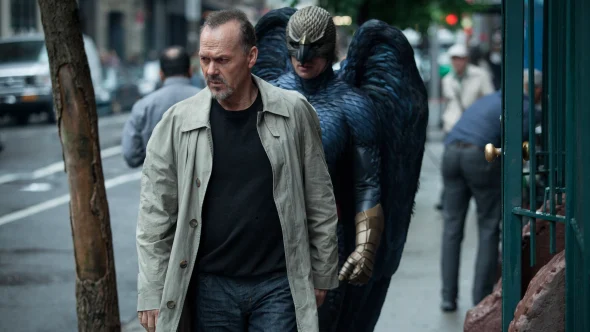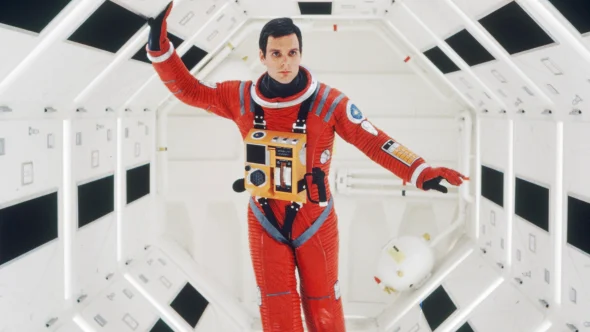
The composer Jerskin Fendrix has one of the most unlikely origin stories. The Brixton-bred musician, né Joscelin Dent-Pooley, was raised in an academic household ("My father was an English literature professor," he explains, "and Shakespeare was quite a large part of my upbringing") and later attended the University of Cambridge to study classic music.
But after graduating, Fendrix pivoted to ultra-modern pop for his debut album, Winterreise. The record's "absurd and stupid" sound, as he describes it, caught the attention of director Yorgos Lanthimos, who tapped Fendrix to compose an original score for his surreal comedy, Poor Things.
"We decided not to discuss any other composers, film scores, or music in general, because it was essential that the musical identity of the film had to be exclusive to Poor Things," the first-time film composer explains. True to word, the score Fendrix crafted is one of a kind.
Now, he is a first-time Oscar nominee for Best Original Score at the 96th Oscars.
"Making this film has been such an extraordinary artistic journey, and being given the freedom to write music without any creative inhibition, to fully interpret and fall in love with Bella's world, and to work with such talented and kind people has been a true privilege," he says of the recognition. "My gratitude to Yorgos for asking me to write the music for Poor Things is impossible to put into words."
Here, Fendrix shares with A.frame his Top 5 and reflects on the influence of composers ranging from Tōru Takemitsu to Hans Zimmer to Johann Strauss II.

Directed by: Akira Kurosawa | Music by: Tōru Takemitsu
I like both of Kurosawa's Shakespeare adaptations; the other one being Throne of Blood. There are so many horrible interpretations of Shakespeare that are missing the point, and there's something about how King Lear is represented in Ran that shows a fundamental understanding of it. There was such a rawness and an emotional vulnerability that is astounding. It looks phenomenal and advertises how many Kurosawa films should have been made in color.
It's a Tōru Takemitsu score. He was a phenomenal academic composer in his own right, but his work for Ran is breathtaking. The combination of traditional Japanese instruments gives a great deal of space and threat, and the occasional blossoming of this extremely intimidating, menacing orchestral theme throughout works in such an outstanding balance. It is phenomenal.

Directed by: Roger Allers and Rob Minkoff | Music by: Hans Zimmer
There's definitely some Shakespeare thread here, because The Lion King is based on Hamlet. There's that part of it that was great for me as a child, and musically, Hans Zimmer won an Oscar for his score, and the Elton John tracks were great. Three of the songs were nominated for the Best Original Song Oscar, with one ["Can You Feel the Love Tonight"] winning. It was one of the first times in a Disney film where after the first few big numbers — great show-stopping stuff with beautiful animation — it dies down, and in comes Zimmer's orchestration. There's a moment of quiet; you see the landscape, the rain starts falling, and you have this single flute coming in. It makes your hair stand up. The cue is called "This Land," and it's a phenomenal piece of music. The emotion it conveys is extraordinary.

Directed by: Alejandro G. Iñárritu | Music by: Antonio Sánchez
Like Poor Things, Birdman has Emma Stone in it, and she's incredible. It also has one of the most astonishing syntheses of preexisting soundtrack and actual score. Antonio Sánchez did the a cappella drum score for it, which is an insanely good piece of music. It's a beautiful score, and it gives so much of the film a uniqueness. Iñárritu compliments that with bits like Rachmaninoff's Symphony No. 2, which is gorgeous, and Ravel's Piano Trio bit, which is the scene where Birdman is coming out of the bar and he hears the guy screaming, "Tomorrow and tomorrow and tomorrow" with this undulating canon underneath it.
Musically, it's a perfectly created film. In terms of films about show business, it accurately conveys the feeling of walking around and things constantly happening in this exhilarating sense of chaos. It also looks gorgeous.

Created by: Pendleton Ward | Music by: Casey James Basichis and Tim Kiefer
I've been thinking about Adventure Time a lot recently, because it's a wonderful piece of programming. It started as a short film and became a TV series and then movies, and the music for it is very underrated. Rebecca Sugar wrote some of the songs, and they're lovely, but if you listen in isolation to what the score is doing, there isn't anything more adventurous and evocative than what that score did. The palette is infinitely wide, and the manipulation of instruments is incredible. It's very emotionally generous, but at the same time, it never lingers on any particular idea of beauty or numinous intensity for much longer than a second. It's very frenetic. In thinking about what scores have inspired me, more than anything, I think it's the Adventure Time score.

Directed by: Stanley Kubrick | Music by: Richard Strauss, Johann Strauss II, Aram Khachaturian, and György Ligeti
It's 2001: A Space Odyssey! It's just a great film. There's a lovely thing I was thinking about recently, which was Stanley Kubrick talking about how he conceived films as having six to eight non-submersible units. He had the idea that each part of the film should be able to function autonomously on its own in terms of theme, narrative, and so on, and then he tried to work out a way of putting that together. That's an incredible, powerful, and liberating way of thinking about a more extended narrative. All of his films embody that principle. I'm not saying anything new here, but I could keep watching it forever and find and feel new things about it each time.
Musically, it is phenomenally inspirational. It's also a nightmare for composers, because there's the story that there was a score written for it, and the composer turned up to the premiere and found out his score wasn't used while he was watching it. That's a story that film composers got told before bed. I can't imagine how horrible that would've been. The soundtrack is all preexisting pieces of classical music, but how it's juxtaposed to elevate certain scenes wouldn't have been possible without that choice of music. A great example is "The Blue Danube" waltz for the docking scene. When considering how music can complement or be a part of a film, these are just examples of it being executed perfectly.







